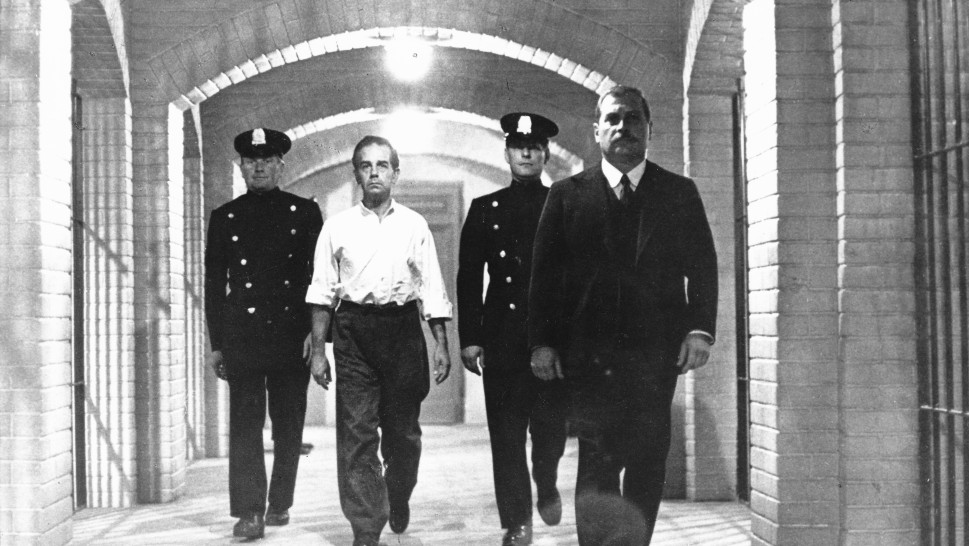Audio transcription
Haden Guest 0:00
Ladies and gentlemen, my name is Haden Guest. I'm Director of the Harvard Film Archive. I want to thank you all for being here tonight. This is a screening in our ongoing series called Cinema of Resistance, in which we present films that tackle, bravely, courageously innovatively—with urgent topics and periods of history. And that is certainly true of tonight's film from 1976, by Giuliano Montaldo, Sacco and Vanzetti.
First, I should tell you to turn off any cell phones, any electronic devices that you have. Please refrain from using them. And I'm very pleased that tonight we have a very special guest, and that’s Jill Lepore, who is a celebrated historian and writer, and teaches here at Harvard. And she's going to say a few words of introduction and contextualization.
I will just tell you, very briefly, that we're going to be seeing a beautiful vintage 35-millimeter print of this film, screened in its original version, which includes both Italian language and English language, with some dubbing, which is just how the film was originally screened. And the Italian version, as well, included dubbing, as well. And dubbing is, as many of you know, pretty standard in Italian cinema. So I don't want anybody to be disoriented by that. Please pick up one of our calendars if you don't have them, and take a look at the wonderful offerings we have. They continue through the month of May. We'll be doing a complete Luchino Visconti retrospective in June, so come back for that, all you lovers of Italian cinema. And now, with no further ado, please join me in welcoming Jill Lepore!
[APPLAUSE]
Jill Lepore 1:49
Hey, good evening! So excited to see almost a full house for this film. I'm just stepping in to offer up a few words of historical context. That's my job. I'm like the, you know, in Monty Python's Holy Grail, where there's the historian? I, hopefully, will survive the evening. This is a total inside joke for Monty Python fans. So Sacco and Vanzetti, the trial of Sacco and Vanzetti, was, sort of, the O.J. Simpson trial of the 1920s. It was very ardently and passionately watched across the country, which is a strange thing, because when the crime for which Sacco and Vanzetti were eventually executed in 1927 happened, it was barely covered, it was really not a very particularly significant crime. The reason that the trial was so celebrated, and also so controversial, had to do with a series of transformations in American political life during the Progressive Era. Before the 1880s, there were no federal immigration restriction laws in the United States. Everyone was welcome to immigrate to the United States, and a surge of anti-immigration feeling began in the 1880s around Chinese immigration, but took a different focus in the period between the 1890s and the 1920s, specifically about Southern European immigrants, who came in huge numbers, beginning in the 1890s. Hungarians, Southern European Jews, and above all, Italians. So there's suddenly an enormous amount of nativist feeling uprising against these Southern Europeans, mainly because they were thought to be lowering wages and because they were thought to be causing all kinds of social turmoil because of their revolutionary political ideas, principally that they were bringing socialism across the Atlantic.
So the great immigration restriction law of the 20th century, is the 1924 National Origins Act, which dramatically restricts immigration. My own family are Italian immigrants, came over in the early years of the 20th century. Those were the some of the last Italians to get in before the passage of that act. Sacco and Vanzetti were both Italian immigrants. They came over at the same time as my grandfather did, about 1908. And they came to the same place. Massachusetts was a real destination for Italian immigrants, who had thriving communities, and had easy access to factory jobs. My grandfather was a socialist—most Italian immigrants were socialists. Sacco and Vanzetti were anarchists, and they were violent anarchists. The fact is, they were quite unlikely to have committed the crime for which they were ultimately executed. But the reason that the trial garnered so much attention was because the progressives of the Progressive Era were reinventing themselves after the First World War, as liberals. Modern liberalism was really born beginning in the 1920s, with a new kind of attachment to the idea of rights. Earlier progressives had fought for the regulation of businesses, their causes were principally closely aligned with socialism. After the First World War, they turned to kind of a rights discourse. And among those rights were the rights of criminal defendants, which were wildly abused in this trial, which—whether Sacco and Vanzetti were guilty or not, the trial was a gross miscarriage of justice. So I myself have not seen this film. I'm super excited to see it! I don't want to delay anyone's experience of it. I just want to tell you though, when I was a kid growing up, my dad always used to tell me that his father, an Italian socialist, used to hitchhike from Clinton, Massachusetts, to Charlestown, Massachusetts, to bring Sacco and Vanzetti sandwiches in a lunch pail in jail once a week. Thanks a lot.
[APPLAUSE]
©Harvard Film Archive













